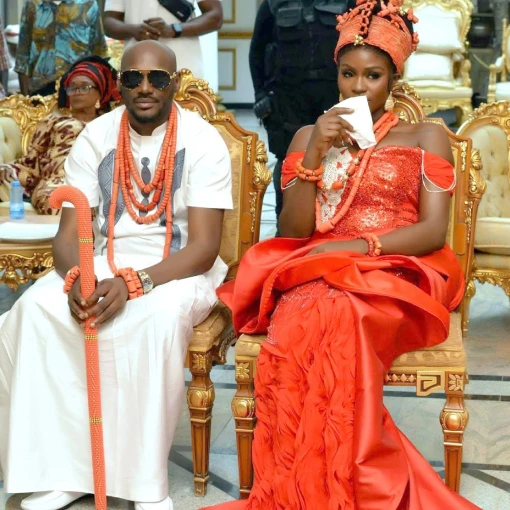 Inioluwa Ogunleye
2 weeks ago
Inioluwa Ogunleye
2 weeks ago
Overview
Recently, the videos and photos of the traditional wedding of legendary singer, Innocent Idibia, popularly called 2Baba and a member of the Edo State House of Assembly, Natasha Osawaru’s set tongues wagging on social media. The ceremony, which had only close family members in attendance, showcased the rich and vibrant culture of Benin, with stunning traditional attire, music, and dance on display.
2Baba was seen donning coral beads, a red velvet wrapper, and a matching beaded cap, while his bride stunned in traditional red attire. They shared a joyful moment when skit maker Mark Angel played the saxophone version of 2Baba’s classic hit “African Queen” during the event.
Many took to social media to share their thoughts on the union. While some sympathised with 2Baba’s ex-wife, Annie Macaulay, with whom he shares three children, others questioned the singer’s swift remarriage, interrogating his eligibility status for another union.
It was in January 2025 that the singer announced the end of his highly publicised marriage to actress Annie on social media. Shortly after his announcement, it was revealed that he was in another relationship with Osawaru. He later proposed to her.
In Nigeria, marriage is governed by three legal systems: statutory (English) law, customary law, and Islamic law. According to nigeria.action4justice.org, to enjoy marriage rights, a person has to be validly married under any of the three recognised marriage systems. These legal systems govern different areas of society including family law, inheritance, and succession.
A person can therefore be married validly under statutory law, customary law or Islamic law and a combination of two or more of the systems.
A statutory marriage is essentially monogamous in nature; this means that a man can only be married to one woman, and a woman can only be married to one man at a time. This type of marriage is also known as marriage under the Act because it is governed by and has to comply with the provisions of the Marriage Act. It comes with enormous benefits and rights for the couple and their children, concerning inheritance, Will and other family matters. In Nigeria, statutory marriage must start from the Marriage Registry but can end up in a licensed place of worship or at any other licensed public place.
The Constitution of Nigeria established the High Courts in states across Nigeria, including the Federal Capital Territory, Abuja. Among other things, divorce and other related issues arising from statutory marriages can only be determined in the High Court of a State. If a matter is settled in a way that is not justifiable to a wife seeking to enforce her marriage rights, she can appeal against the judgment of the High Court at the Court of Appeal and the final court is the Supreme Court of Nigeria.
Marriage under customary law is governed by native law and custom. It is polygamous in nature (in other words, it is a marriage between a man and one or more wives). At times, it allows one woman to marry multiple husbands. The native law and customs of communities across Nigeria govern customary marriages made under them as well as issues of inheritance, divorce, and other related issues.
This custom does not enjoy judicial recognition, (Meribe v. Egwu 1976, 3 S.C 23). Such customs have been declared unlawful and invalid by the Supreme Court of Nigeria.
There is no uniform customary law that governs the whole of Nigeria. Different localities in Nigeria have practices which due to a long history of accepted usage, have come to be known as customary law and are binding on people who are subject to it. Customary law is mostly unwritten but can be enforced by courts if the existence of such customary law is proven before the courts.
For a customary practice to have the force of law, it must not be repugnant to natural justice, equity, and good conscience, it must not be incompatible with any existing law, and it must not be an ancient customary practice, but one which exists at the present time. (Evidence Act, Section 18 (3); Lewis v Bankole (1908) 1 NLR 81 at 102 and Dawodu v Danmole (1962) 1 All NLR 702).
All native laws and customs in Nigeria bow to the Constitution and laws in Nigeria. Hence, at all times, customs, customary laws, rites, rituals, processes, rights, and duties under customary marriage must not and cannot conflict with any rights created by any law in Nigeria.
The Customary Courts and Area Courts of the States in Nigeria, including the Federal Capital Territory, can hear and legally resolve customary issues relating to marriages under customary law and the rights or duties that arise out of the same.
If a matter is settled in a way that is not justifiable to a wife seeking to enforce her marriage rights, the Customary Courts of Appeal in the States and the Federal Capital Territory are established and empowered to review and supervise such matters. Appeals from the Customary Court of Appeal go to the Court of Appeal, and the final court is the Supreme Court of Nigeria.
In the case of Obi & Ors v Bosah & Ors (2019) LPELR-47243(CA), it was held: “it is the law that there are two essentials of a valid marriage. These are the payment of the bride price and the handing over of the bride to the groom.” The same principle was stated in the cases of Agbeja v Agbeja (1985) 3 NWLR (Pt 11) and that of Okolonwamu v Okolonwamu (2014) LPELR-22631 (CA).
In addition, another essential ingredient for the celebration of this kind of union is the consent of both parties to the marriage as well as the parents of the bride, who are supposed to collect the bride price from the groom. In Osamwonyi v Osamwonyi (1972) LPELR-2789 (SC), the court held that “consent is not only basic but fundamental to a potentially polygamous union such as a Customary Marriage.”
Some people classify Islamic and customary law as one. However, the finding of the court in the case of Khairie Zaidan v Fatimah Khalil Mohssen (1973) LPELR-SC.52/1973 proves that this is not the case.
Islamic law is not customary law and as such, has its own unique approach and process for marriage. Islamic law is a religious-based doctrine and not a native law and custom; it binds its faithful. The Nigerian Constitution guarantees freedom of religion, and this allows and guarantees Islamic law and Islamic marriages.
Islamic law is based on the doctrines of Islam and applies to persons who practice the religion and accept it as their personal law. Islamic family law provides for issues relating to marriage, the rights and duties that arise out of marriage, dissolution of marriage and others.
In an interview with a national newspaper recently about 2Baba and Annie’s case, a lawyer and legal expert, Oluwatodimu Ige, popularly known as Oga TheLawyer, stated that unless a man was properly divorced according to the law, he could not enter into another legally-sanctioned marital union.
Ige said, “According to the law, if you are married under the Marriage Act—commonly referred to as a court wedding, where you are issued a marriage certificate—that marriage must be formally dissolved by a competent court before either party can remarry. This type of marriage can be conducted either at the marriage registry, which is superior to the local government registry, or at a licensed place of worship such as a church or mosque. Some churches are licensed to conduct such weddings, so couples don’t necessarily have to go to the registry.
“Once a marriage certificate is issued, the marriage is considered valid under the Act. Therefore, any attempt to remarry without first obtaining a legal dissolution from a high court amounts to bigamy, which is a criminal offence.
“However, if the marriage was conducted under traditional law, some customs permit a man to have more than one wife. In such cases, as long as it aligns with the relevant customs, it may be allowed. But if the marriage falls under the Act, the existing marriage must be legally dissolved before entering into another one.”
Speaking further on the consequences, the lawyer added that if a marriage is not legally dissolved, any other marriage contracted is null and void.
Echoing Ige’s statements, a respected professor of Law at the University of Lagos, Taiwo Osipitan (SAN), noted that unless a divorce had been finalised, neither party could enter into another legal union.
He, however, explained that a couple can have an “introduction ceremony” without running afoul of the law. He said, “An introduction is not the same as a marriage. Under customary law, there are three key components of a valid customary marriage: first is the introduction, where both families are formally introduced; second is the payment of the bride price or dowry; and third is the formal handing over of the bride by her parents to the groom’s family.
“All three steps must be completed for the marriage to be considered valid. If only one or two of these occur, there is no legal marriage; what exists is merely cohabitation or an intention to marry, but not an actual marriage.”
In 2011, Lagos State for instance, decriminalised bigamy, meaning that it is no longer a criminal offence to marry another person while already legally married. However, the new marriage will be considered void and will not legally supersede the prior marriage.
While the state said it was part of a broader effort to remove outdated laws from the statute books, THISDAY gathered that the main was because women were not coming to report their husbands who contravened the law.
Though while bigamy is no longer a criminal offence, it doesn’t mean polygamy is legally recognised. The second marriage is still not legally recognised.



